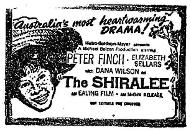 8344541048881766932.jpg
8344541048881766932.jpg
 8344541048881766932.jpg
8344541048881766932.jpg
'Tale of the wanderings of a Sydney husband who takes to the road with five-year-old daughter after finding his neglected wife living with another man.'
Source: British Film Institute (http://ftvdb.bfi.org.uk/sift/title/50475). (Sighted: 7/4/2014)
 Reel Men : Australian Masculinity in the Movies, 1949-1962
Carlton
:
Melbourne University Press
,
2019
17379128
2019
multi chapter work
criticism
Reel Men : Australian Masculinity in the Movies, 1949-1962
Carlton
:
Melbourne University Press
,
2019
17379128
2019
multi chapter work
criticism
'Set against the shifting social and political backdrop of a nation throwing off the shackles of one war yet faced with the instability of the new world order, Reel Men probes the concept of 1950s masculinity itself, asking what it meant to be an Australian man at this time. Offering a compelling exploration of the Australian fifties, the book challenges the common belief that the fifties was a 'dead' era for Australian filmmaking. Reel Men engages with fourteen Australian feature films made and released between 1949 and 1962, and examines the multiple masculinities in circulation at this time. Dealing with beloved Australian films like Jedda (1955), Smiley (1956), and The Shiralee (1957), and national icons of the silver screen including Chips Rafferty, Charles 'Bud' Tingwell, and Peter Finch, Reel Men delves into our cultural past to dismantle powerful assumptions about film, the fifties, and masculinity in Australia.' (Publication summary)
'Enduring popular narratives posit the 1950s as a time of gendered oppression and conservative stability. While previous historians have pointed to the social and political changes of the period, their work has understood culture as a passive reflector of these transformations. Through analysis of four Australian films, this article argues that the contemporary cultural landscape was a dynamic space that actively negotiated between competing ideals. Exploring the representation of distinct albeit legitimate models of masculinity in these films, this article reveals the complex and unsteady gender order unfolding in the cultural world of the 1950s.' (Publication abstract)
'Enduring popular narratives posit the 1950s as a time of gendered oppression and conservative stability. While previous historians have pointed to the social and political changes of the period, their work has understood culture as a passive reflector of these transformations. Through analysis of four Australian films, this article argues that the contemporary cultural landscape was a dynamic space that actively negotiated between competing ideals. Exploring the representation of distinct albeit legitimate models of masculinity in these films, this article reveals the complex and unsteady gender order unfolding in the cultural world of the 1950s.' (Publication abstract)
 Reel Men : Australian Masculinity in the Movies, 1949-1962
Carlton
:
Melbourne University Press
,
2019
17379128
2019
multi chapter work
criticism
Reel Men : Australian Masculinity in the Movies, 1949-1962
Carlton
:
Melbourne University Press
,
2019
17379128
2019
multi chapter work
criticism
'Set against the shifting social and political backdrop of a nation throwing off the shackles of one war yet faced with the instability of the new world order, Reel Men probes the concept of 1950s masculinity itself, asking what it meant to be an Australian man at this time. Offering a compelling exploration of the Australian fifties, the book challenges the common belief that the fifties was a 'dead' era for Australian filmmaking. Reel Men engages with fourteen Australian feature films made and released between 1949 and 1962, and examines the multiple masculinities in circulation at this time. Dealing with beloved Australian films like Jedda (1955), Smiley (1956), and The Shiralee (1957), and national icons of the silver screen including Chips Rafferty, Charles 'Bud' Tingwell, and Peter Finch, Reel Men delves into our cultural past to dismantle powerful assumptions about film, the fifties, and masculinity in Australia.' (Publication summary)